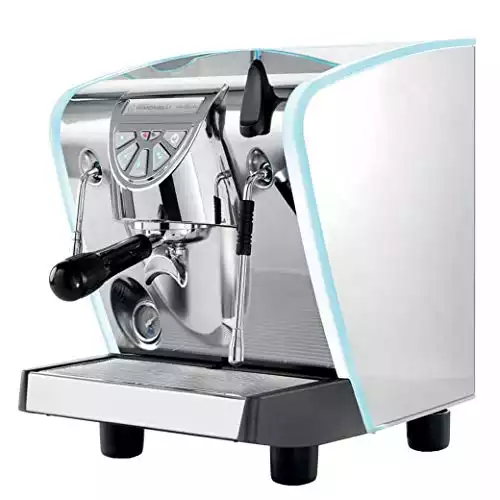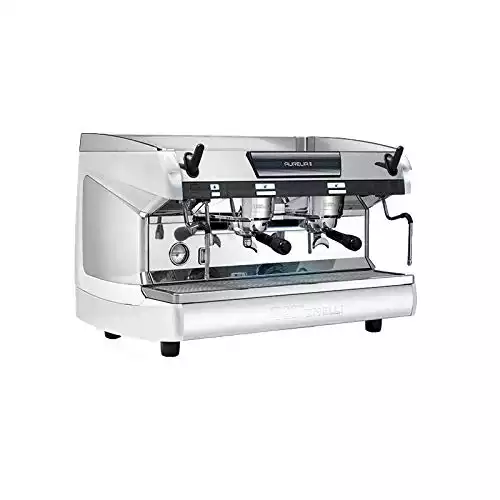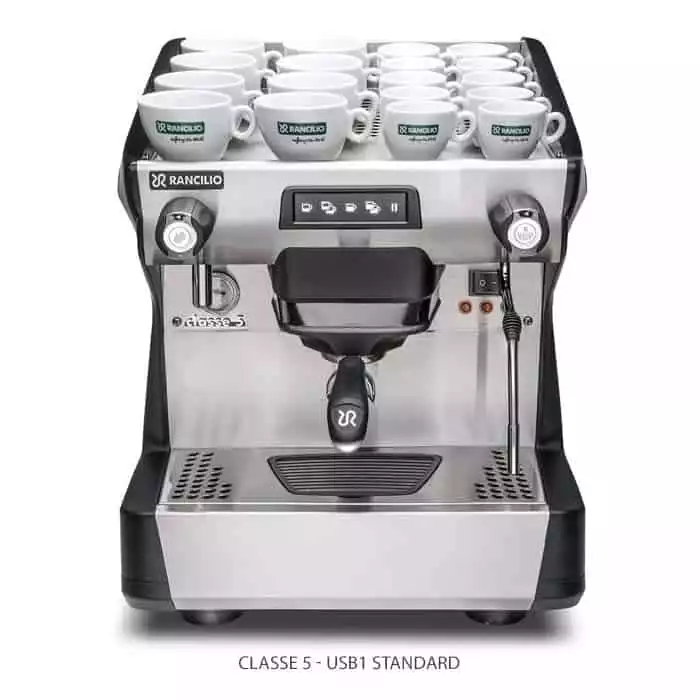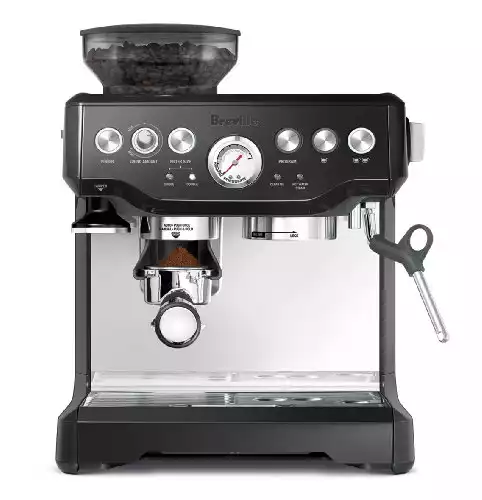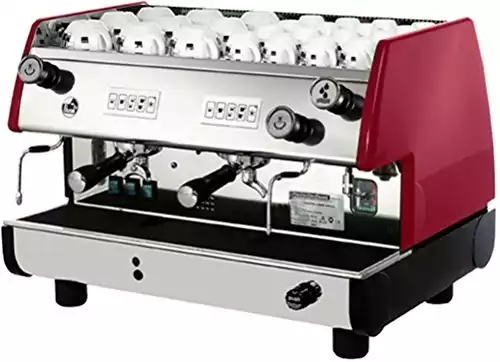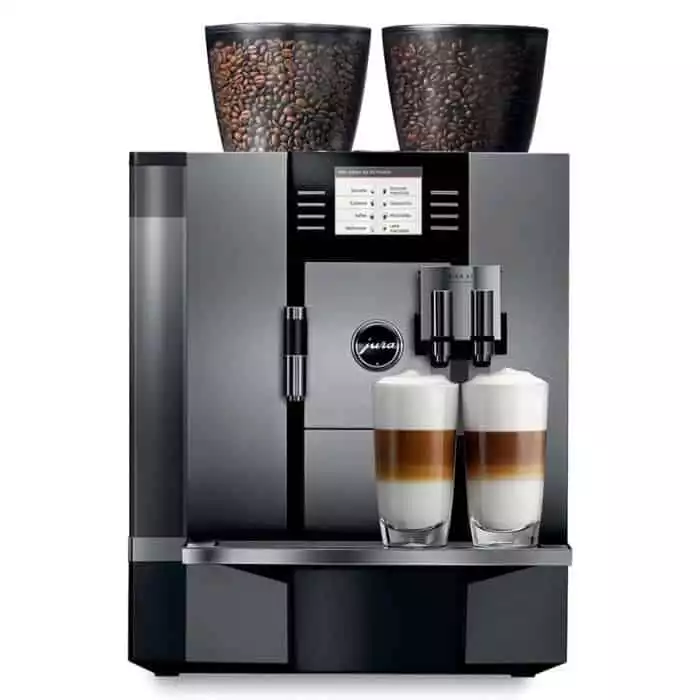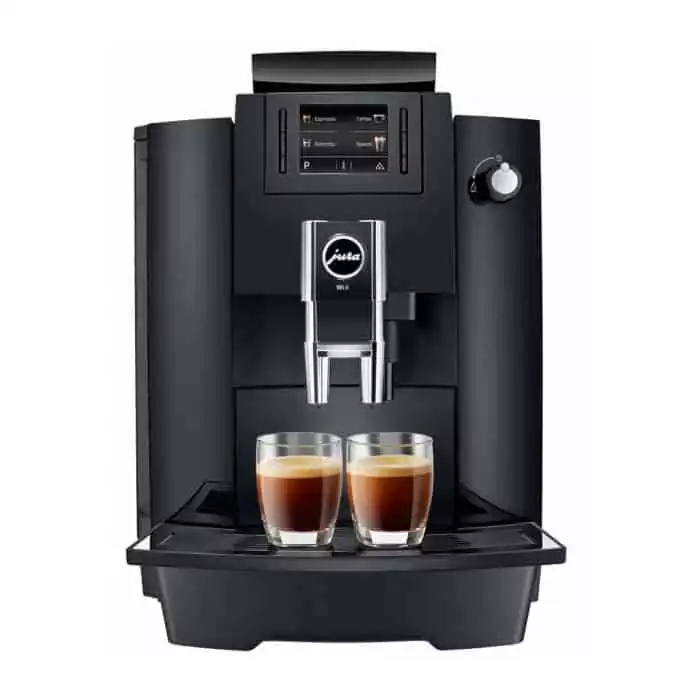What’s The Best Commercial Espresso Machine 2024?
I get excited when people who love coffee explore sharing their passion. Be it high-level home brewing or putting up a coffee shop. One isn’t necessarily better than the other.
As a commercial opportunity, I see coffee as a high potential, profitable, and honest product. It’s the only “want” that’s as close to a “need” that I know of in the food and beverage industry.
In a cafe setting, the espresso machine can be functional and decorative at the same time. It can be the crowning glory for customers and baristas alike.
Below I run through your options if you’re looking for the best commercial espresso machine available for businesses of all sizes. But, if you’re in a rush, here’s my top pick:
Alternatives At A Glance
The complete solution if you’re without a barista and catering to medium volume.
Perfect for low volume, with 8 pre programmed espresso based drinks. Great for small venues where there isn’t huge demand.
The 7 Best Commercial Espresso Machines 2024
I’ve experienced working in so many different types of coffee shops. I’ve also experienced using different tiers of commercial espresso machines.
From a 10sqm cafe to a coffee shop that sold an average of 300 cups every 3 hours, I’ve experienced more variety than most in my time as a coffee consultant and barista.
This is why I’ve come to realize that an espresso machine is a force multiplier and not the actual centerpiece of your cafe. The best commercial espresso machine fulfills your needs perfectly.
A poorly fitting espresso machine, on the other hand, tends to become underutilized. It can have all the features you don’t need, all while being at a price you can’t afford. That isn’t good for business and just plain unnecessary. Your machines should never be better than your people, especially when you’re starting out.
You also don’t want your vision for your coffee establishment to far surpass your machine’s capabilities. Choosing an odd fit can weigh down your workflow and your ROI. With that said, let’s take a look at a variety of options that you can explore further.
1. Nuova Simonelli Pour Over Tank Version Lux Espresso Machine
The Simonelli is my top pick for a small commercial set up.
This single group commercial espresso machine by Nuova Simonelli is a workhorse than can easily power a small cafe. It can also support the coffee side of a large dine-in restaurant.
PROS (+)
- Electronic soft infusion (pre-infusion) function
- Adjustable brew temperature
- Powerful commercial steaming
- Programmable espresso pulling
CONS (-)
- Water reservoir design
- Large and heavy set up
It uses a single, dual heat exchange boiler for maximum consistency at its price point. The listed pros above ensure that the art of espresso making is in the barista’s hands, more than the machine’s.
While there are concerns over the hot water dispenser design, a simple workaround is to gather hot water from the group head. Thus, Improving the life of any espresso machine.
If you’re a fan of this machine’s design and features but need higher output, check out the Nuova Simonelli Aurelia II, as mentioned earlier.
2. The Simonelli Aurelia II
The Simonelli Aurelia II can make 200-300 cups a day. If you’re looking for something with power, functionality, and real ability, then this is it.
PROS (+)
- The Barista Championship machine
- Great for high volume service
- Advanced temp stability controls
CONS (-)
- Pricey
- Takes up a lot of room
With its copper boiler, brewing and steaming at the same time is no issue. With its advanced temp controls, you can rest assured you’re pulling the perfect shot each time with ease and on repeat.
It has a sensor for any change in water quality for your coffee (which, interestingly enough, is said to more than half any consistency issues). The Aurelia II also has so many other barista-friendly functions! On the ownership side, it’s more energy-efficient as well.
Overall the Simonelli Aurelia II is currently the best showcase of the brand’s quality, but you do have to be willing to invest significantly to enjoy this machine.
3. Rancilio Classe 5 S Tank Commercial Espresso Machine
In the past I’ve tested out the Rancilio espresso machine In a 150sqm pizza parlor. While that would be a mismatch for a cafe of the same size, it was able to cater to this particular setup effectively.
PROS (+)
- An espresso machine that packs a punch for its size
- Steam wand design that is user-friendly in form and function
- Has a volumetric pump
- Independent heat exchange technology keeps espresso temperature and boiler pressure consistent
CONS (-)
- Hot water valve design has flaws
- Minimalist/classic design doesn’t match its price point and features
It stands out because I remember being pleasantly surprised by the espresso’s quality, especially for a pizza place. When I asked the owner about his espresso machine’s price, I was surprised but impressed because the Rancilio has focused more on the internals vs the exterior design.
If you care about quality over looks, this is as good a pick as any on this list. It has all the essential features, and it’s a no-frills choice. Nonetheless, It’s one of the best for what it does.
4. Breville BES 878BSS Barista Pro Espresso Machine
This espresso machine is close to my heart. I usually recommend it to outfits exploring the potential of serving coffee at a (very) small commercial scale.
It’s affordable enough to be painlessly transferred for home or commissary use if you prove that espresso-based drinks are profitable enough to invest in upgrades.
PROS (+)
- Built in burr grinder is a space saver
- Programmable espresso shots
- Espresso machine is very light and small, easy to place in a tiny shop
- Affordable price point
CONS (-)
- Underpowered steaming
- Not suited for high volume
If you’re on a budget or just looking to explore the espresso demand at your spot first, this is a good pick.
You will need an experienced barista to craft decent drinks from it, and you will have to sell your vision a bit. But once you pull espresso shots and steam milk correctly on this machine, you can do it on any other machine in any commercial setting easily.
It has all the base features needed to make good espresso. Sure your margins for error are smaller, but that’s part of the joy of making coffee!
Related read: Best semi auto espresso machines
5. La Pavoni BAR-T 2V-R Commercial 2 Group Volumetric Espresso Machine
Any cafe that I work with takes a certain amount of consistent demand before a 2-group machine makes sense. Many start with this setup, but I usually suggest starting smaller on equipment and go bigger on training.
PROS (+)
- 2 group option for high and fast espresso demand
- Direct water line compatible (plumb-in)
- 14L heat-efficient and antimicrobial copper boiler
- Independent radiator hydraulic system for consistent machine boiler temperature
CONS (-)
- Not a budget price point for a 2-group machine
- Takes up way more space and consumes way more electricity than a single group
If you do want to start with a 2-group commercial espresso machine, I would suggest one at around this price point, with these features, at the very least anyway.
This workhorse from La Pavoni is reliable and relatively consistent enough for even specialty grade coffee. It’s an easy pick on this list if you are projecting a high demand!
Related Read: Commercial Coffee Grinders, Plumbed In Coffee Machines
6. Jura GIGA X7 Professional
With this super-automatic machine, Jura wanted to bring cafe-level coffee to any setting without hiring a coffee professional.
The complete solution if you’re without a barista and catering to medium volume.
PROS (+)
- High-tech informative display
- Professional-grade quality espresso that is made on a super automatic machine
- Built-in ceramic burr grinders
- Automatic rinsing and cleaning
CONS (-)
- Less control over your espresso
- Professional baristas won’t have much use with the built-in features of this machine
The technology that it’s built with is sound, and it should make coffee at a certain level consistently.
However, if you plan on launching a third wave or specialty coffee shop, you are better served by looking into other semi-automatic options on this list.
If you enjoy your cappuccinos or lattes, and you want them fast and consistent at your restaurant, this is already a good pick. You won’t have to spend on training, and you’ll have less wastage from espresso calibration and latte art practice.
7. Jura WE6
(Best Budget Fully Automatic Pick)
Jura’s second entry on this list feels like it’s optimized for home use. With that said, you can infer that I’d recommend this for a small restaurant rather than a full-blown cafe.
Perfect for low volume, with 8 pre programmed espresso based drinks. Great for small venues where there isn’t huge demand.
PROS (+)
- Beautiful display
- 8 pre-programmed espresso-based options
- Built-in conical burr grinder
- Height-adjustable spout for different cup sizes
CONS (-)
- Maximum of around 30 drinks per day
- Concerns over espresso consistency
The 8 pre-programmed drinks are good for at home, but are definitely limiting for a coffee shop setting.
Look into this option a bit more if the demand from your shop is for simple coffees. For anything more complicated, try to scroll back to semi-automatic options available.
Buyers Guide
Now you’ve been exposed to features and configurations of commercial espresso machines, which ones stood out? Which features are nice to have, and which are need-to-haves? How do you feel now vs your initial mindset on espresso machines?
Let’s quickly discuss a few more areas for you to think about. My aim is to help you arrive at more clarity to help your coffee shop get started on the right foot with a perfectly matched commercial espresso machine.
In this next part, we will be exploring this commercial espresso machine purchase from the vantage points of an owner and a barista.
Required Volume
OWNER: In the process of deciding on a spot to put your cafe in, you should consider forecasting demand based on space and location.
To guide your expectations, you usually have 2-3 big customer waves in a day: first thing in the morning, post-lunch, and late afternoon.
With that said, you need to know espresso machine capacities based on demand. Do customers trickle in or will they be coming in huge waves that make up 90% of your daily sales? You will need different machines for each o these scenarios.
A commercial-grade single group espresso machine can churn out 20-30 cups an hour with an experienced barista. That’s non-stop pulling. 2 group espresso machines provide a means for you to make 40-60 cups an hour.
The numbers to be crunched on your end are the electricity costs. A single group is more cost-efficient if you won’t be maximizing the capacity of a 2 group. There are ways to make workflows more efficient to speed up the production rate using a single group.
A single group with a double boiler should suffice in cases where customers trickle in. If you’re not expecting massive rushes, you’ll survive with a one group espresso machine. Commercial ones are heavy-duty and made for all-day service!
BARISTA: As a coffee professional, you will want to gauge machine features and how they satisfy the type of customers your shop attracts. You will also want to know what kind of control you need over your coffee based on your target market.
One of the most important things to consider is workflow.
Ask yourself:
- How big is your bar?
- How big are the waves of customers that come in?
- Are you fulfilling a total waiting time less than 4 minutes per transaction?
Include ordering until serving the coffee out. If they take too long to order, perhaps entertain the idea of mixing your menu or including drink descriptions.
I’ve realized that the most challenging setups have allowed me to grow and fine-tune my workflow. Mastery of all kinds of espresso machine types allowed me to be immune to changing bar formats.
Try to work with what you have, but also know when it’s time to suggest an upgrade. We need to make quality coffee fast and consistently for the entire industry to grow.
Brew Versatility
OWNER: It’s always good to match your commercial espresso machine with your concept and menu. Are you food-forward with good coffee?
Then perhaps a super-automatic machine will suit your needs. Will the barista also be a cashier and a food server? That makes another good case for a small, automatic espresso machine.
On the other hand, will you be coffee-forward? Will you be continuously making new drinks? Will your customers want a quadruple ristretto? Or maybe an Australian long black?
If so, your barista will need to be skilled and knowledgeable. They will also need more control over your commercial espresso machine. A dual boiler system would help out a lot in terms of speed and consistency.
BARISTA: The first thing that career baristas look at in a cafe is the espresso machine. It’s our playground. Our love…You get the drift.
We diligently research the brand, features, and the proper techniques of using said machines.
We look for mastery and control so we can make lots of drinks and have fun. This is just one of many reasons to get a semi automatic espresso machine. If it fits your concept that is.
Super-automatic machines, on the other hand, allow us to work on hand brewing or customer service. Or improving on add-ons for your coffee recipes. The espresso side will take care of itself. This is good, and well, if the customers don’t look for a specific coffee type.
A semi-automatic or “manual” machine for coffee will demand for the barista to focus on the base a lot more: espresso. The upside? It also offers way more control. With the right machine features, that is.
It all really depends on your concept. But semi-automatic commercial espresso machines open up more possibilities. The best commercial espresso machines can even be used to lure decent baristas into working at your shop!
Automatic VS Manual
OWNER: As briefly touched on in the previous section, you’ll need to decide on automatic vs manual commercial espresso machines before anything else.
Ask yourself:
- Do you want quality and control?
- Will you have a dedicated barista?
- Is your concept quality focused?
- Will you be looking to expand your espresso-based offerings regularly?
These are cases to be made for semi-automatic or manual espresso machines. Coffee-forward shops absolutely need excellent espresso above everything else.
Relatedly think about:
- Will your staff lineup have multiple roles?
- Do you want your coffee to be made fast?
- Are you food forward?
- Will your menu be comprised of set coffee offerings?
- Does your counter have limited space for an espresso machine?
These are cases to be made for buying automatic espresso machines.
BARISTA: Specialty coffee baristas are usually in it for the art of making coffee. That includes crafting that perfect espresso and pouring good latte art.
These are features you enjoy with manually making espresso-based coffee drinks. Well-made espresso machines make more efficient use of steam power and brew temperature consistency.
The lower-tiered ones can produce similar results with a little more effort and know-how. For example, you will want to purge for 5-10 seconds on some espresso machines to lower the brewing temperature. In doing so, you release the hot water in the boiler and end up with something a few degrees cooler in your portafilter.
You can choose a decent automatic espresso machine for shops or concepts that aren’t centered on espresso-based drinks. This way, you can potentially save up on coffee training, shrink your R&D budget, and lessen overall wastage and capital expenditure overall for sure.
Some career baristas want a break from crafting 500 drinks per shift, which is totally fine and normal. While some want to learn about food or boost their customer service strengths. These things you can do when your espresso-making is automated. It’s best to see how the mission and vision of the cafe align with your career goals.
Investment Budget
OWNER: We’ve reached the most important topic on the business side of things: budget.
I personally suggest that the commercial espresso machine should be no more than 10-20% of your total cafe investment. Anything above 20% will make your operations a crawl to make back what you spent on the espresso machine.
To direct your inquiry, you have to first and foremost know what type of commercial coffee establishment you want to put up. Next, try to level with your location, expected foot traffic, and operating expenses.
When you inevitably circle back to the espresso machine aspect, do your research on each machine within your budget.
Do you want to be known for fast service? Is it a drive-through setup? You will want a machine that can do almost double the capacity of what you forecast.
This protects you from high barista turnover and allows you to maximize your space. Mor generally, you need to plan to be successful, and you have to be smart with your investments.
Will you invest in good interiors and service? Do you want to be known as a sit-down place? What’s the average waiting time for your food selection?
If so, then a single group and an experienced barista will suffice. The global standard is 2 minutes and 30 seconds per espresso-based drink.
With decent aesthetics, comfy seating, and a long wait time for food, your coffee will feel fast. If the customers will wait a bit, then there’s no rush to get a high-volume workhorse.
Dual boiler machines allow you to steam and pull shots at the same time to maximize efficiency. This wouldn’t be of utmost importance for the above set up.
BARISTA: Just because we aren’t owners of the cafes we work in doesn’t mean that we shouldn’t take note of the investment budget. Early in my career, I watched and learned every aspect of running a shop. It helped me see that each element needed to be completed well so that the entire shop would run smoothly.
On the topic of espresso machines, you get to reinforce your espresso basics using different types of machines. In switching up your workflow, you have a chance at a deeper understanding of brewing coffee.
You will notice that while an espresso machine isn’t the most essential variable for making good espresso, it still can affect the overall quality.
When you get to see the piece of equipment you’re handling as part of the overall shop, you’ll care for it more and strive to maximize it further. You are in a unique spot because you get to learn from the current budget management processes but get none of the risks from it.
Grind Capacity
OWNER: To be entirely direct, I believe that your grinders should be on the same level of quality as your commercial espresso machines. It interacts closely with the actual coffee beans and therefore has a slightly more prominent effect on taste.
It would be a waste to invest in the best espresso machine and pair it with a cheap grinder. This is something to consider deeply as you shop around for your cafe parts.
Remember that burr grinders are the best for even grinding. You can get confused with so many features out there but focus on how fast the grinder can dose your portafilter per serving. That is usually 18 grams. Every second will count when there’s a rush!
Your grinder should comfortable be able to match your commercial espresso machine’s output!
BARISTA: It’s good to know your full menu and the whole vision for the coffee business. If you know both completely, you can make appropriate reads on production and shop capabilities.
For example, you can make your slow days’ cold brew production days if that’s among your offerings. You can also schedule ground bean sales on these days, depending on your grinder’s maximum capacity. These are pieces of information listed on the web or loosely given out by your suppliers.
One small recurring mistake can eventually lead to a huge mess when it comes to grinders and commercial espresso machines. Prevention is better than cure here.
Best Commercial Espresso Machine Brands
Now that you’ve gone through some additional aspects to look at in commercial espresso machines, I will leave you with one final list: some good espresso machine brands to get you started on your own research.
These are time-tested, consistent, and sturdy. And of course, they produce good espresso.
Rancilio
This company has been around since 1927. Since then, they’ve had 46 patents with different machines, from 20 in-house specialists. They are present in over 100 countries worldwide, so you know that sales and servicing are easier.
Their machines look simple, but the internals are dream-like. This is a bonus for me and how I breakdown the value of any machine.
The after-sales aspect is enormous. Part of running a shop is maintaining your commercial espresso machines well. With the size of the investment in them, you’ll want to overshoot the two-year expected lifespan. Invest in training, good people, and implement opening and closing checklists well!
La Pavoni
Desiderio Pavoni created the first bar coffee machine in 1905. Since then, the technologies have evolved, but they remain reliable in terms of features and giving users a fair amount of control.
I love how their machines look and how they execute the simple act of running hot water through ground coffee beans.
This is one of my favorite picks for single groups and is currently the home machine that I recommended for my family. It was the best option for their coffee requirements, and it could be yours too!
Nuova Simonelli
Nuova Simonelli has been around since 1936. They are considered by some to produce at the mid-level the best commercial espresso machine options. In fact, they’re probably the most visible among these 3 brands.
Their machines are dreamy in terms of looks, but they also deliver on essential features. Soft infusion, dual boilers, and consistent brew temperatures are just some necessary capabilities that they execute on well.
If you want the best, sensible, commercial machine, take a deeper look at their product offerings.
One commercial espresso machine that has caught my eye as of late is the Simonelli Aurelia II, which we reviewed earlier. Great if you need to brew upto 300 cups a day!
The Final Verdict
My top pick is the Nuova Simonelli Lux Espresso Machine (Pour Over version). If I were to start a small cafe any time soon, I’d want to build around this espresso machine. Why?
I would want to serve no more than 40 espresso-based drinks an hour. I’d provide a means to sell cold brew bases, tea, or other specials to balance out the bar. The food would be fast so I need the power of this machine as well.
I’d also like to serve customers who would appreciate the baristas and their skill and control over their coffee orders.
For these reasons, the Lux is the best commercial espresso machine for my needs.
I hope that you learned some new things from this piece. At the very least, perhaps you have new ways of thinking about the best commercial set up for you!
Remember that the best product doesn’t just come out of the best machine; it’s a mix of systems, people, training, implementation, and forecasting as well.
Good luck, and keep brewing!

